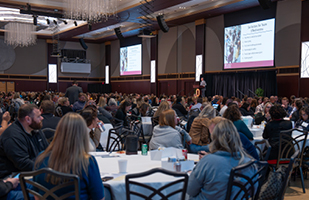Specialized Dockets Leave Individual Impact on Communities

Nearly 600 people from court treatment teams across the state learned how to improve their practices during the Supreme Court Specialized Dockets Conference.

Nearly 600 people from court treatment teams across the state learned how to improve their practices during the Supreme Court Specialized Dockets Conference.
Nearly 600 people from treatment court teams across the state met to advance their practices during the Supreme Court Specialized Dockets Conference.
During her welcome speech, Chief Justice Sharon L. Kennedy thanked the representatives for their work.
“You are helping to create safer and healthier communities and giving many individuals the second chance they need to improve their life circumstance,” said Chief Justice Kennedy.
The Supreme Court certifies 255 programs that address substance abuse or mental health disorders in adults and children. Some are broad, while others focus on specific issues, such as domestic violence, human trafficking, veterans, and reentry.
To be certified, each court must adopt the Supreme Court’s research-based guidelines and standards. Courts can then tailor the docket to its community and participants needs. It takes partnerships and the dedication of treatments teams composed of court staff, probation officers, mental health providers, and peer support workers to help people succeed in changing their lives.
The goal is to work with people who need the most help and demonstrate the highest risk of recidivism. Specialized dockets focus on treating a person’s illness and other personal factors that may contribute to their behavior. By intervening when the offender is first introduced to the justice system, treatment teams can offer the support and resources necessary to break patterns and keep participants from returning to court, jail, or prison.
At this year’s annual conference, judges, magistrates, and treatment team representatives learned the latest science and research and heard from national experts on the subject.
“The conference really helps get everybody on the same page,” said Sarah Jeu, program coordinator for the Supreme Court’s Specialized Dockets Section.
The day was packed with large sessions to share important updates and best practices regarding specialized dockets, along with breakout sessions for attendees based on their own court’s interests.
Topic of discussion included mental health, veterans, reentry, risk need assessments, clinical assessments, family involvement, breaking stigmas, and confidentiality among much more.
James Boleyn, the special dockets director for Marion Municipal Court, had the opportunity to attend the conference both as an observer and presenter. Boleyn oversees the court’s three specialized dockets – veterans treatment, mental health, and adult drug treatment.
During his session, Boleyn emphasized the importance of having a seat at the table in as many community coalitions as possible.
“By having a presence on that coalition, we make sure that the needs of our participants are present in the goals and objectives of that coalition,” Boleyn said.
Those needs go beyond mental health and addiction treatment. Oftentimes, it starts with necessities like acquiring steady work, affordable housing, food, and clothing.
He explained the mission of treatment courts requires the help of community partners to be successful. The goal is to give the offender the tools needed to change their lives, which can reduce recidivism, as well as the financial burden on communities.
Chief Justice Kennedy asked attendees to reflect on how they can increase public awareness of the work of each court’s specialized dockets, how to build treatment teams when key players are missing, and how to grow successful reentry.
“The commitment of the broader judiciary in Ohio to serving the public through specialized dockets is self-evident. More than one out of every three judges that can operate a specialized docket are doing so, and we are continuing to grow,” said Chief Justice Kennedy. “All of you are a part of Ohio’s story of success.”


